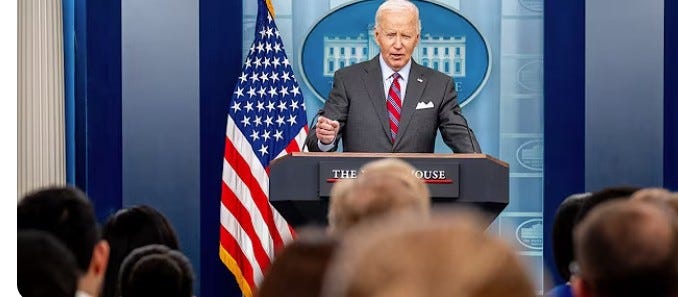After meeting with Donald Trump last week at Mar-a-Lago, right-wing autocrat and Hungarian Prime Minister Viktor Orbán confirmed that, if elected, Trump will cut off all aid to Ukraine, effectively hastening the collapse of Ukraine against the continued onslaught of Russian forces. As reported by Claudia Chippa, writing for Politico:
“He will not give a penny in the Ukraine-Russia war,” Orbán told Hungarian state media Sunday. “Therefore, the war will end, because it is obvious that Ukraine can not stand on its own feet.”
As Chippa reports, Trump’s plan is essentially to allow Russian Vladimir Putin to have free reign, anticipating Europe’s inability to continue provision of sufficient military aid to Ukraine. Orbán’s statement directly confirms this thinking: “[I]f the Americans don’t give money, the Europeans alone can’t finance this war. And then the war is over.”
Except the “war” won’t be over—as Trump suggests—if Ukraine is overrun or otherwise obliterated. It is not clear whether Trump and Orbán discussed Trump’s oft-repeated intention to abandon NATO entirely, leaving much of Eastern Europe to defend itself against continued Russian aggression. But the abandonment of Ukraine alone under the present circumstances by a reelected Trump and his pro-Putin allies in the Republican Party would simply foreshadow the first stage of a massive global realignment favoring Russia, China, and other autocracies. And that would ultimately supplant the international order as it currently exists, with the United States irrevocably consigned to a diminished, weakened status as an untrustworthy and unreliable ally.
RELATED STORY: Trump’s affection for dictators is at the heart of his plans for America. And Ukraine
Viktor Pinchuk, also writing for Politico, first explains the consequences to Ukraine should Trump’s plans be fulfilled.
If Ukraine cannot push Russia back, there will not be a stable stalemate. Russia will throw all it has into “conquering” Ukraine. It will obliterate cities completely, as demonstrated by its conquest of Mariupol, where Russia is estimated to have killed 25,000 people and destroyed 90 percent of residential buildings. That is the Russian way of war. Russia’s army will imprison, torture or kill anyone who refuses to “belong” to Russia. Remember the Bucha massacre? Bucha had 37,000 inhabitants, compared to Ukraine’s 44 million. As Russia advances, 5, 10, 100 or more Buchas may occur.
The obliteration of Ukraine itself, however, would hardly be the only consequence of a Trump capitulation. As Pinchuk notes, “Russia’s strategy includes making Ukraine uninhabitable, driving refugees into Europe,” a result that would cost the EU “dozens of billions” of Euros as it tries to assimilate those refugees. Pinchuk believes that the political fallout from this refugee influx as well as continued military aid would ultimately assist the ascendance of pro-Russia parties in the EU, as the costs of placating and appeasing Russia are portrayed as more attractive than the costs of opposing it. Meanwhile, states such as Latvia, Lithuania, Estonia, Poland, and Moldova would struggle economically to try to forestall Russian attacks on their own countries.
Without a credible U.S. threat as a counterweight, these border countries would be forced to choose between placing themselves on a permanent war footing and soliciting NATO assistance or appeasing Putin’s demands. The military budgets of the more “secure” members of NATO would also have to radically adjust to existing in a constant state of existential threat, an economic reordering that Putin’s intelligence and disinformation apparatus will target and exploit. As Pinchuk observes:
With an emboldened aggressive Russia right at the border of the EU, deterrence will be needed far beyond what governments plan now. Defense budgets in Europe during the Cold War averaged 3.5 percent of GDP. Now they are lower than 2 percent in many European countries. Returning to Cold War-levels would mean for the UK $39 billion more per year, for Germany $86 billion, and for France $43 billion. For NATO as a whole to hit 3.5 percent of GDP on defense spending, it would require $410BN more per year.
Meanwhile, Putin has already set his country on the course to perpetual war. As reported by Pavel Luzin and Alexandra Prokopenko, writing for CarnegiePolitika:
The Russian government has announced its proposed budget for 2024. For the first time in modern history, the country is set to spend 6 percent of gross domestic product (GDP) on the military, and defense spending will exceed social spending.
[…]
The record defense spending shows that the Kremlin has no intention of ending its war against Ukraine anytime soon: on the contrary. Even if the fighting becomes less intense or the conflict becomes frozen, the money will go toward replenishing Russia’s depleted military arsenals. Likewise, it has enough cash to fund an escalation such as the imposition of martial law or full mobilization.
As the absolute ruler of a supine and largely cowed population. Putin possesses inherent advantages that Western democracies do not: He has no political opposition able or willing to object to his war aims. And to the extent the Russian standard of living decreases as a result of Putin’s dictatorial reallocation of resources, his systematic oppression of the Russian people can simply be increased to deter further political grumblings.
The outcome for the United States if Trump’s planned scenario is pursued is bleak. Pinchuk states what Putin doubtlessly already knows:
For sure, if the Kremlin is successful in Ukraine, Russian support for terrorists all over the world would strengthen. As will cooperation with Iran and North Korea. These regimes which use death, terror, and fear at home and abroad, will challenge the West. Every additional crisis that affects the West is good for them (and Russia). And of course China watches if the West defends the rules it proclaims. If the impression is that the West is incapable of resolute and sustainable defense, a Chinese invasion of Taiwan becomes more likely.
If you are a Western middle-class citizen who values the life you live, the cost of this change of organizing principles of the international system, of the tone and ideology of the world you live in, will be beyond imagination — and it will be very costly for many decades.
The potential for U.S. abandonment of Ukraine has not been lost on the Baltic states of Latvia, Lithuania, and Estonia, which managed to escape the yoke of Soviet domination since the fall of the Berlin Wall. Faced with the potential betrayal of the NATO military alliance by a reelected Donald Trump, those NATO members most likely to bear the initial brunt of a future Russian military assault are rethinking their physical defenses. In particular, those states and Finland (which shares an 830-mile border with Russia) are reevaluating their participation in the 1997 anti-personnel landmine treaty, of which they and 129 other nations are signatories.
As reported by the Washington Post’s Michael Birnbaum:
Two years after Russia’s invasion of Ukraine, countries such as the Baltic states and Finland warn that a threat to their own territory may be just over the horizon, with some intelligence agencies saying the Kremlin could make such an attempt within a decade. Now they are taking lessons from their enemy’s robust defense lines in Ukraine, noting that Russia’s system of minefields, concertina wire and trenches made it all but impossible for Kyiv’s forces to advance last summer.
While none of the Baltic states has yet determined to withdraw from the mine treaty (which does not restrict the use of anti-tank mines, for example), as Birnbaum notes, should Russia continue to advance in Ukraine (assisted by the deprivation of military aid sought by Trump), those countries stand little chance of repelling a Russian onslaught without the use of anti-personnel mines.
In January of this year Estonia, Latvia, and Lithuania announced they would jointly build a Baltic defense line along their borders with Russia and Belarus. As reported by Lukas Milevski, writing for the Foreign Police Research Institute, the underlying premise of the Baltic states’ defense strategy is to convey to Russia the severe negative consequences of attacking them. However, as Milevski acknowledges, none of the Baltic countries is geographically large enough to concede any significant ground, and therefore must ultimately rely on NATO to abide by its commitments, which Donald Trump has clearly telegraphed that the U.S. will renege on should he become president.
But assuming the U.S. abandons Ukraine, Putin will be in a far more favorable position to forestall the remainder of NATO’s commitment to defend the Baltics, Poland, or Finland, biding his time until he’s managed to politically corrupt the NATO democracies in the same way he has corrupted the U.S. political system through his influence over Trump and the Republican Party.
Eventually, however, NATO would almost certainly respond, given the existential threat it faced from Putin’s Russia. The question at that point would be whether the U.S. would even come to Europe’s aid, or more precisely, whether the political will would exist to do so. As explained by Nataliya Bugayova, Russian fellow at the Institute for the Study of War:
Allowing Russia to win its war in Ukraine would be a self-imposed strategic defeat for the United States. The United States would face the risk of a larger and costlier war in Europe. The United States would face the worst threat from Russia since the collapse of the Soviet Union, as a victorious Russia would likely emerge reconstituted and more determined to undermine the United States — and confident that it can.
Americans are famously indifferent to foreign policy (another fact that Putin relies on), and U.S. elections are rarely framed by foreign policy considerations. But if Trump is reelected, and he follows through with his intent to utterly abandon Ukraine (as Orbán has now confirmed he will), within a few short years Americans will be living in a world far less forgiving of that indifference.
RELATED STORY: Ukraine Update: Russian missile strikes within a few hundred meters of Zelenskyy
Campaign Action










